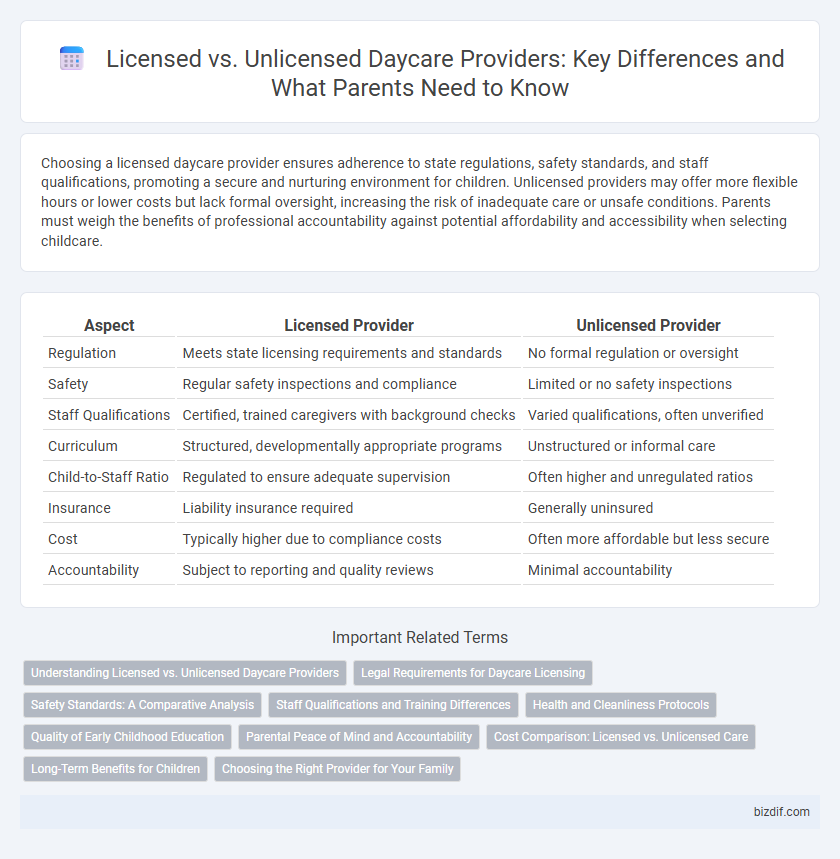Choosing a licensed daycare provider ensures adherence to state regulations, safety standards, and staff qualifications, promoting a secure and nurturing environment for children. Unlicensed providers may offer more flexible hours or lower costs but lack formal oversight, increasing the risk of inadequate care or unsafe conditions. Parents must weigh the benefits of professional accountability against potential affordability and accessibility when selecting childcare.
Table of Comparison
| Aspect | Licensed Provider | Unlicensed Provider |
|---|---|---|
| Regulation | Meets state licensing requirements and standards | No formal regulation or oversight |
| Safety | Regular safety inspections and compliance | Limited or no safety inspections |
| Staff Qualifications | Certified, trained caregivers with background checks | Varied qualifications, often unverified |
| Curriculum | Structured, developmentally appropriate programs | Unstructured or informal care |
| Child-to-Staff Ratio | Regulated to ensure adequate supervision | Often higher and unregulated ratios |
| Insurance | Liability insurance required | Generally uninsured |
| Cost | Typically higher due to compliance costs | Often more affordable but less secure |
| Accountability | Subject to reporting and quality reviews | Minimal accountability |
Understanding Licensed vs. Unlicensed Daycare Providers
Licensed daycare providers meet state requirements for health, safety, and caregiver qualifications, ensuring regulated oversight and consistent standards. Unlicensed providers, while often more flexible and affordable, operate without official state supervision, which may increase risks related to child safety and program quality. Parents should evaluate factors like caregiver credentials, facility conditions, and regulatory compliance when comparing licensed and unlicensed daycare options.
Legal Requirements for Daycare Licensing
Licensed daycare providers must comply with state-specific legal requirements such as background checks, child-to-staff ratios, health and safety standards, and facility inspections to ensure a safe environment for children. Unlicensed providers often operate without adhering to these regulations, which can increase risks related to child welfare and limit parents' legal recourse in case of issues. Understanding the strict legal framework for licensing helps parents make informed decisions about selecting a daycare that guarantees compliance with public health and safety laws.
Safety Standards: A Comparative Analysis
Licensed daycare providers must comply with state-mandated safety standards, including child-to-staff ratios, background checks, and facility inspections, which ensure a safer environment for children. Unlicensed providers often lack regular oversight, resulting in inconsistent safety practices and increased risk of injury or neglect. Parents seeking reliable childcare should prioritize licensed providers to guarantee adherence to established safety regulations and protections.
Staff Qualifications and Training Differences
Licensed daycare providers must meet state-mandated staff qualifications, including background checks, minimum education levels, and ongoing professional development courses to ensure child safety and quality care. Unlicensed providers often lack standardized training requirements, leading to variability in caregiver expertise and potentially inconsistent child supervision. These differences impact the overall reliability and educational value of the daycare environment.
Health and Cleanliness Protocols
Licensed daycare providers adhere to strict health and cleanliness protocols regulated by state authorities, including regular sanitation, immunization requirements, and illness exclusion policies to ensure child safety. Unlicensed providers often lack standardized health inspections and may not implement consistent hygiene practices, increasing the risk of exposure to infections. Parents should prioritize licensed facilities for adherence to comprehensive health regulations that protect children's well-being.
Quality of Early Childhood Education
Licensed daycare providers meet state regulations that ensure a minimum standard of safety, staff qualifications, and curriculum quality, which significantly impacts the overall quality of early childhood education. Unlicensed providers often lack formal oversight, increasing the risk of inconsistent educational practices and lower developmental outcomes for children. Choosing licensed providers is crucial for parents seeking structured, evidence-based learning environments that support cognitive, social, and emotional growth.
Parental Peace of Mind and Accountability
Licensed daycare providers adhere to strict state regulations, ensuring safety standards, staff qualifications, and regular inspections, which offer parents peace of mind. In contrast, unlicensed providers lack formal oversight, potentially compromising accountability and increasing the risk of inconsistent care quality. Choosing a licensed provider guarantees transparent accountability and a safer environment for children.
Cost Comparison: Licensed vs. Unlicensed Care
Licensed daycare providers typically charge higher fees than unlicensed providers due to regulatory compliance, staff qualifications, and safety standards. Unlicensed care often offers lower rates but may lack formal oversight, increasing potential risks for quality and child safety. Comparing the cost difference highlights that licensed care investments generally translate to better protection and structured environments.
Long-Term Benefits for Children
Licensed daycare providers adhere to strict regulatory standards, ensuring a safer environment and higher quality of care, which supports children's cognitive and social development over time. Children in licensed settings benefit from structured learning activities and trained caregivers who promote consistent developmental milestones and emotional well-being. Unlicensed providers may lack these safeguards, potentially limiting long-term educational and behavioral advantages for children.
Choosing the Right Provider for Your Family
Choosing the right provider for your family means prioritizing licensed daycare providers who meet state regulations for safety, staff qualifications, and facility standards. Licensed providers undergo regular inspections and follow strict guidelines, ensuring a secure environment that supports child development. Unlicensed providers may offer flexible options but lack formal oversight, increasing the risk of inconsistent care and safety concerns.
Licensed provider vs Unlicensed provider Infographic

 bizdif.com
bizdif.com